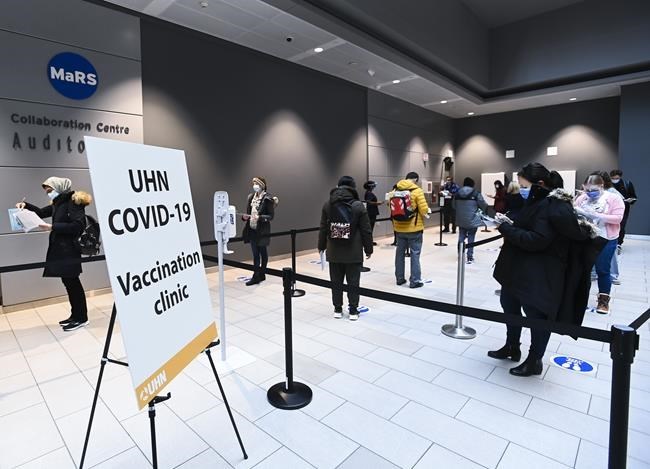New federal forecasts project that COVID-19 variants could fuel a potential third wave that would eclipse its predecessors if Canada doesn't double down on strict public health protocols — a warning the Ontario government appears to be heeding as it extends stay-at-home orders in some hard-hit regions.
The Public Health Agency of Canada released modelling Friday suggesting that while infections continue to decline nationally, the spread of virus mutations threatens to reverse that progress.
Canada's chief public health officer says there are currently fewer than 33,000 active cases in Canada, a 60 per cent drop compared to a month ago.
But with more contagious variants now detected in all provinces, Dr. Theresa Tam says Canada may not be able to avoid a rapid acceleration of daily cases without continued vigilance.
"We are at a critical point in the pandemic and our efforts have begun to tip the balance in our favour," Tam told reporters.
"Protecting our progress and limiting the impact of variants of concern will require stronger action."
The government's projections indicate that the circulation of these strains could push Canada's caseload to more than 20,000 new diagnoses by mid-March if public health measures are relaxed further.
Even if current remain in place, the country could see infections increase by more than 10,000 per day in April, according to the modelling.
Tam said the concern is that Canada could be heading down a rapid growth trajectory that would outpace the daily increases of roughly 8,000 new cases recorded in early January.
The current national average of 2,900 new cases per day is 60 per cent higher than the peak of the first wave, she added.
Tam said the variants are approximately 50 per cent more transmissible and linked to more severe disease outcomes. Of particular concern is the B117 variant first detected in the U.K., which public health officials suspect may become the new "circulating virus," said Tam.
But even as variants spread across the country, Tam said Friday's forecasts indicate that Canada could control the outbreak with enhanced public health measures, such as restrictions, closures and community-based control protocols.
She urged provinces to avoid the "yo-yo-ing effect" of relaxing and reinstating restrictions, saying consistency is key to preventing sweeping measures such as lockdowns and curfews.
"You can't just keep doing the same thing and expect a different result."
At a news conference Friday, Prime Minister Justin Trudeau said he's encouraged his provincial counterparts to take a cautious approach to reopening as they work to ramp up vaccine delivery.
Trudeau also said Canada received a shipment of more than 400,000 doses of the Pfizer-BioNtech vaccine on Wednesday — the largest delivery to date.
The provinces and territories are preparing to roll out almost a million and a half doses of COVID-19 vaccines over the next three weeks, said Trudeau.
But for Canada to stay ahead in the race against the variants, Trudeau said authorities and individuals alike have to exercise caution to give the vaccine rollout time to work.
"We know that experts still have to evaluate carefully which threshold of vaccination will allow us to start releasing some of the restrictions in various places across the country."
The Ontario government said Friday that hot spots Toronto and Peel, as well as a northern community where variants are spreading, will remain under a stay-at-home order for at least two more weeks to preserve health-system capacity.
"These are difficult but necessary decisions, in order to protect against COVID-19 variants and maintain the progress we have all made together," Health Minister Christine Elliott said in a statement.
York Region, however, will join other jurisdictions that have seen restrictions on gatherings and businesses loosened as it moves to the second-strictest category of Ontario's tiered pandemic framework.
The Progressive Conservative government has been moving ahead with its economic reopening despite warnings it could set off a third wave of infections.
Ontario NDP Leader Andrea Horwath said the decision to reopen York Region and other areas is "putting politics ahead of public health," while Premier Doug Ford defended the move saying he's being cautious in the hardest-hit zones.
In other provinces too, the tension between reopening and continued restrictions have become a source of political discord.
On Friday, the Quebec government released a written recommendation from the province's public health director suggesting the government relax public health measures on March 8 if the situation remains stable.
Opposition parties in the province have been calling on the Coalition Avenir Quebec government to release Dr. Horacio Arruda's written recommendations for months.
Liberal Party Leader Dominique Anglade said the documents raised questions about whether the government's decisions, such as a strict 8 p.m. curfew that's been in place since early January, are motivated by political or public health concerns.
Meanwhile, in Saskatchewan, the Opposition called on Premier Scott Moe's government to outline a plan to protect against a possible spike in COVID-19 cases caused by variants. .
This report by The Canadian Press was first published Feb. 19, 2021.
Adina Bresge, The Canadian Press



